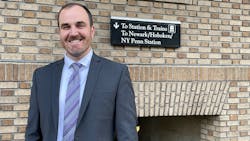- One word to describe yourself: Purposeful
- Alma Mater: Bucknell University; Northwestern University
- Fun fact about yourself: I won an Oreo Stacking Contest in third grade.
- Favorite station or stop that you have ever visited or frequent (and why): Hoboken Terminal as my extended family has generational roots in Hoboken and my wife and I took our engagement pictures here.
Michael Banoub, PE, has not only led and managed several complex and high-profile mass transit projects in the New York metropolitan area, he has created opportunities for young professionals to further develop their knowledge of the transit industry. In addition, Banoub’s passion for giving back—whether through intern development programs or charitable efforts to donate canned food to a local food bank—is a testament of his character and is emblematic of his leadership style.
Banoub’s first assignment on Access to the Region’s Core, a design project to ultimately expand commuter rail access between New York City and New Jersey, quickly developed into a passion for mass transit and for advancing transit infrastructure projects. While the project did not ultimately get constructed, Banoub learned valuable lessons on this project including the importance of collaboration between stakeholders, leadership and relationship-building.
Using these core principles, Banoub developed as a strong design engineer over the next few years where he identified and then followed specific design criteria for each project while also taking constructability, operations/maintenance, sustainability and third-party impacts into account. He applied this mindset to his Superstorm Sandy recovery and resiliency projects for several New York City Transit and New Jersey Transit projects. With this design experience under his belt, Banoub went on to earn his professional engineering license in the state of New York.
Having a strong basis in design, Banoub’s interests began to broaden and he took roles in project management overseeing scoping, planning, design, procurement, third-party coordination, force account and construction while also ensuring projects were completed on time and on budget. Banoub led and managed high-profile projects including the Port Authority of New York & New Jersey’s PATH’s Hoboken Station resiliency to ensure that the station, including its elevator shaft which was inundated from storm surge during Superstorm Sandy, remained watertight during extreme weather events. In addition, Banoub managed a PATH project to replace flood-damaged interlockings, track and signal infrastructure along the Newark to World Trade Center PATH line, a critical commuter link between Newark, New Jersey and Lower Manhattan. As PATH service operates under Positive Train Control (PTC) control, Banoub advanced coordination to address necessary revisions to the PTC system during construction and was PTC-compliant following construction.
Following Banoub’s projects at PATH, he took on a leadership role on a design-build project at New York’s Penn Station, the busiest railroad station in North America. The purpose of this project, Long Island Rail Road’s (LIRR) East End Gateway and LIRR Concourse – Phase II, is to expand the LIRR concourse from 30 feet to 57 feet and raise the ceiling height to 18 feet. Banoub’s role on this innovative design-build project was package manager for four design packages, covering the necessary street level and utility relocation work on West 33rd Street between 7th and 8th Avenues--adjacent to the world-famous Madison Square Garden and prominent One and Two Penn Plaza. Banoub managed a multi-disciplinary team of engineers to deliver all design packages under an expedited schedule.
While Banoub was advancing critical passenger rail projects, he also became involved externally in professional associations including Young Professionals in Transportation - New York (YPT-NYC), where he served for three years in a variety of leadership roles, including deputy chair, vice chair-finance and vice-chair-programs. During his tenure at YPT-NYC, he created opportunities for young professionals in various transportation-related fields to come together to learn from each other and build relationships across disciplines and the public/private sectors. While Banoub spent several years leading YPT-NYC, he also is a member of the Metropolitan Railway Club of New York City and an alum of the Eno Center for Transportation’s Mid-Manager Seminar in 2018.
In addition to the professional associations Banoub has also led HNTB’s Summer Intern Program in New York, where he developed an engaging summer program for the 15 interns to better connect with each other, learn more about HNTB and develop a stronger understanding of the mass transit industry. Moreover, Banoub has also been active in volunteering his time for charitable efforts as well, having led a team at his company at the time, WSP, to donate about 1,000 cans of food to a local food bank in New York City.
What do you enjoy most about your job?
I enjoy knowing that my work contributes to improving and maintaining mobility within the New York Metropolitan Region in a sustainable and equitable manner. Whether leading projects to improve a transit system’s climate resiliency, service capacity or accessibility, I take great pride in knowing the projects I work on are helping to make our transportation stronger, faster and open to more people.
Accomplishment you’re most proud of and why?
I’m proud of leading and managing two critical resiliency projects at PATH’s Hoboken Terminal. Most people in this region have likely seen the image of the devastating storm surge rushing through the station’s only elevator during Superstorm Sandy. My work with the PATH team will help to protect the elevator and underground station during extreme weather events in the future.
Best advice/tip/best practice to share from your area of expertise?
As you move through your career, develop trusted mentor/mentee relationships where you feel comfortable sharing your successes and challenges. Having benefited as a mentee, I understand first-hand how valuable these relationships can be. Now, I feel privileged to be in a position in my career to pay it forward whether through arranging development opportunities for interns or formally mentoring recent college graduates.



